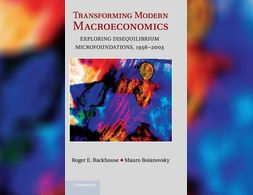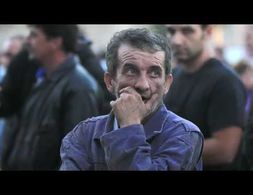✕
606 results
This brief but comprehensive account of the Post Keynesian approach to economic theory and policy is ideal for advanced undergraduate and postgraduate students in economics, public policy and other social sciences. Clear, non-technical and with a strong policy focus, it will also appeal to all of those who are dissatisfied with mainstream economics and wish to explore the alternatives.
The Austrian tradition in economic thought had a profound influence on the development of post-war economics including neoclassical orthodoxy, game theory, public choice, behavioral economics, experimental economics and complexity economics.
This course teaches basic concepts relevant in political economy. Topics include the contractual nature of the state, public versus private goods, property rights and economic externalities, the logic of collective action and social choice theory. It also refers to the fundamentals of political philosophy, bringing two ideas of liberty into the picture. The relevance and limitations of the economic approach to the study of law and politics are then discussed.
Anwar Shaikh explores alternative economic explanations, emphasizing 'real competition' theory and the role of imperfections in economic patterns.
Feminist economics critically analyzes both economic theory and economic life through the lens of gender, and advocates various forms of feminist economic transformation. In this course, we will explore this exciting and self-consciously political and transformative field.
The Routledge Handbook of Heterodox Economics presents a comprehensive overview of the latest work on economic theory and policy from a 'pluralistic' heterodox perspective.
Contributions throughout the Handbook explore different theoretical perspectives including: Marxian-radical political economics; Post Keynesian-Sraffian economics; institutionalist-evolutionary economics; feminist economics; social economics.
p>Twenty-first-century economists will have to understand and improve a post-Cold War world in which no single economic theory or system holds the key to human betterment. Heterodox economists have much to contribute to this effort, as a wave of pluralism spawns new lines of research and new dialogues among non-mainstream economists.
In this book the author develops a new approach to uncertainty in economics, which calls for a fundamental change in the methodology of economics. It provides a comprehensive overview and critical appraisal of the economic theory of uncertainty and shows that uncertainty was originally conceptualized both as an epistemic and an ontological problem.
More Heat Than Light is a history of how physics has drawn some inspiration from economics and also how economics has sought to emulate physics, especially with regard to the theory of value. It traces the development of the energy concept in Western physics and its subsequent effect upon the invention and promulgation of neoclassical economics.
This book tells the story of the search for disequilibrium micro-foundations for macroeconomic theory, from the disequilibrium theories of Patinkin, Clower and Leijonhufvud to recent dynamic stochastic general equilibrium models with imperfect competition.
Despite some diversification modern economics still attracts a great deal of criticism. This is largely due to highly unrealistic assumptions underpinning economic theory, explanatory failure, poor policy framing, and a dubious focus on prediction. Many argue that flaws continue to owe much of their shortcomings to neoclassical economics.
In economics the dominant framework for exploring the structure of market economies is provided by the neoclassical school of thought. This text aims to show how neoclassical theory is used to model market mechanisms, both in particular markets and in the market economy as a whole.
This book gives a very clear overview of the history of Macroeconomics and how it has evolved. It reflects on the different perspectives and debates that have defined the field, with valuable insight into the history and theory of economic policy.
After completing the workshop in Post Keynesian Economics participants should be able to describe the main differences and similarities between PKE and other schools of thought.
Currency hierarchy and policy space: A research agenda for development economics Barbara Fritz
This course is designed to provide students with an understanding of work-related gender issues and to enable students to analyze the issues using the tools of economics.
Firms are the primary places where economic activity takes place in modern capitalist economies: they are where most stuff is produced; where many of us spend 40 hours a week; and where big decisions are made about how to allocate resources. Establishing how they work is hugely important because it helps us to understand patterns of production and consumption, including how firms will react to changes in economic conditions and policy. And a well-established literature – led by post-Keynesians and institutionalists – holds that the best way to determine how firms work is to…wait for it...ask firms how they work. This a clearly sensible proposition that is contested in economics for some reason, but we’ll ignore the controversy here and just explore the theory that springs from this approach.
an interactive guide to the game theory of why & how we trust each other
The Learning Economy and the Economics of Hope' brings together the most important contributions by an expert on policies, management and economics of innovation and knowledge. It offers original insights in processes of innovation and learning and it draws implications for economic theory and public policy. It introduces the reader to important concepts such as innovation systems and the learning economy.
Modern authors have identified a variety of striking economic patterns, most importantly those involving the distribution of incomes and profit rates. In recent times, the econophysics literature has demonstrated that bottom incomes follow an exponential distribution, top incomes follow a Pareto, profit rates display a tent-shaped distribution. This paper is concerned with the theory underlying various explanations of these phenomena. Traditional econophysics relies on energy-conserving “particle collision” models in which simulation is often used to derive a stationary distribution. Those in the Jaynesian tradition rely on entropy maximization, subject to certain constraints, to infer the final distribution. This paper argues that economic phenomena should be derived as results of explicit economic processes. For instance, the entry and exit process motivated by supply decisions of firms underlies the drift-diffusion form of wage, interest and profit rates arbitrage. These processes give rise to stationary distributions that turn out to be also entropy maximizing. In arbitrage approach, entropy maximization is a result. In the Jaynesian approaches, entropy maximization is the means.
In the graveyard of economic ideology, dead ideas still stalk the land.
The recent financial crisis laid bare many of the assumptions behind market liberalism—the theory that market-based solutions are always best, regardless of the problem. For decades, their advocates dominated mainstream economics, and their influence created a system where an unthinking faith in markets led many to view speculative investments as fundamentally safe.
Readers of economic and political theory as well as students of economic planning will appreciate this classic, now available for the first time in English. Written eighty years ago, when Sorel became disillusioned with the official socialism of the German and French Marxist parties, this new translation presents Sorel's analysis of the rise and fall of the two great modern ideologies: socialism and liberal capitalism.
Macroeconomics in Context: A European Perspective lays out the principles of macroeconomics in a manner that is thorough, up to date, and relevant to students. With a clear presentation of economic theory throughout, this latest addition to the bestselling "In Context" set of textbooks is written with a specific focus on European data, institutions, and historical events, offering engaging treatment of high-interest topics, including sustainability, Brexit, the euro crisis, and rising inequality. Policy issues are presented in context (historical, institutional, social, political, and ethical), and always with reference to human well-being.
This course is an introduction to macroeconomics with a specific focus on the euro area. The theoretical part provides a critical presentation of the two key macroeconomic models: the (neo)classical approach and the Keynesian approach. This allows a comparative analysis of important macroeconomic topics:
- unemployment
- inflation
- government debt and Modern Monetary Theory
- banks and financial crises.
The policy-oriented part discusses the monetary policy of the ECB and the specific challenges for fiscal policy in the euro area. The course also presents other euro area specific topics: Optimum currency area, euro crises, Next Generation EU and Green New Deal.
This book discloses the economic foundations of European fiscal and monetary policies by introducing readers to an array of alternative approaches in economics. It presents various heterodox theories put forward by classical economists, Marx, Sraffa and Keynes, as a coherent challenge to neoclassical theory.
This lecture offers a general and introductory overview of the theory of racial capitalism, focusing on the origins of racial capitalism and some of the debates it has generated.
This lecture is based on the “Introducing the Economy” chapter from the Economy Studies book, which introduces the first building block in their framework for transforming the economics education. The aim is to give students a feel and
understanding of the economy as part of a bigger whole. Thus, it is aimed to introduce to students before getting into the economics curriculum with theory and models.
This is a revolutionary and powerfully argued feminist analysis of modern economics, revealing how woman's housework, caring of the young, sick and the old is automatically excluded from value in economic theory. An example of this pervasive and powerful process is the United Nations System of National Accounts which is used for wars and determining the balance of payments and loan requirements.
"The New Classical Macroeconomics "gives an accessible, rigorous, critical account of the central doctrines of the new classical economics, without unnecessarily difficult mathematics. It focuses on four central issues: the foundation of monetary theory; monetary and fiscal policy; labour supply and business cycles; and the attack on econometric models.
The productive work of widely distributed academic research has contributed substantially, over the postwar period, to important advances in our understanding. It has also offered a clearer recognition of many unresolved problems. Never theless, the progress achieved over the last decades, ex hibited by the systematic application of "theory" to actual issues and observable problems, could not overcome a per vasive sense of dissatisfaction.
Renowned scholars elaborate a critique on neoclassical economics and how it was unable to predict and even favoured the financial crisis. They refer to DSGE models, equilibrium theory and rational agents – a brief insight in the critique on neoclassic economics.
In the second video of the series Investigating International Finance, an alternative view on capital controls is given contrasting with the paradigm of classical trade theory which suggests that the removal of trade and capital barriers is associated with higher market efficiency. After explaining the conceptual mechanisms underlying capital controls, examples are introduced where countries actually apply capital controls and how these controls have been associated with a lesser exposure to international financial crises spillovers.
We use cookies on our website. Click on Accept to help us to make Exploring Economics constantly better!





























